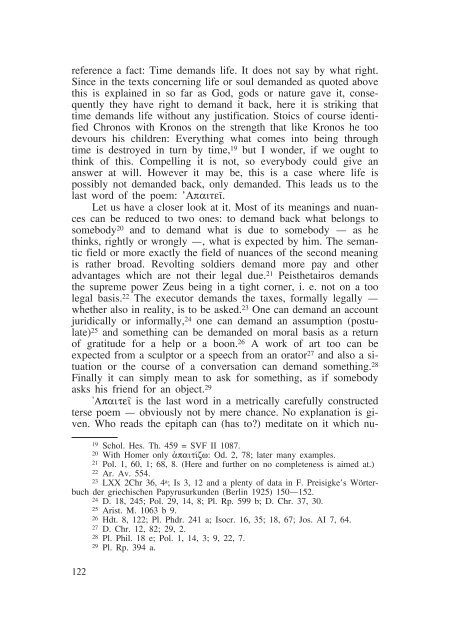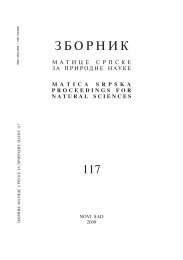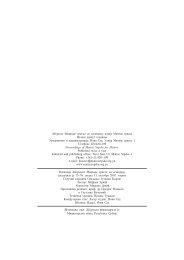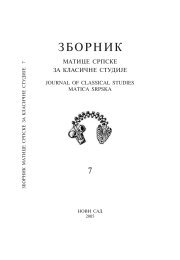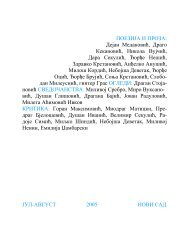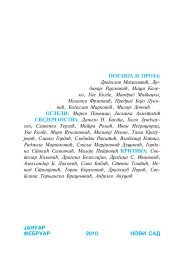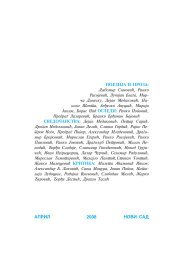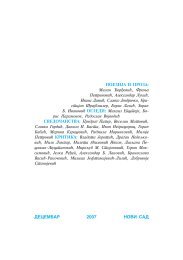Create successful ePaper yourself
Turn your PDF publications into a flip-book with our unique Google optimized e-Paper software.
eference a fact: Time demands life. It does not say by what right.<br />
Since in the texts concerning life or soul demanded as quoted above<br />
this is explained in so far as God, gods or nature gave it, consequently<br />
they have right to demand it back, here it is striking that<br />
time demands life without any justification. Stoics of course identified<br />
Chronos with Kronos on the strength that like Kronos he too<br />
devours his children: Everything what comes into being through<br />
time is destroyed in turn by time, 19 but I wonder, if we ought to<br />
think of this. Compelling it is not, so everybody could give an<br />
answer at will. However it may be, this is a case where life is<br />
possibly not demanded back, only demanded. This leads us to the<br />
last word of the poem: 'Apaiteì.<br />
Let us have a closer look at it. Most of its meanings and nuances<br />
can be reduced to two ones: to demand back what belongs to<br />
somebody 20 and to demand what is due to somebody — as he<br />
thinks, rightly or wrongly —, what is expected by him. The semantic<br />
field or more exactly the field of nuances of the second meaning<br />
is rather broad. Revolting soldiers demand more pay and other<br />
advantages which are not their legal due. 21 Peisthetairos demands<br />
the supreme power Zeus being in a tight corner, i. e. not on a too<br />
legal basis. 22 The executor demands the taxes, formally legally —<br />
whether also in reality, is to be asked. 23 One can demand an account<br />
juridically or informally, 24 one can demand an assumption (postulate)<br />
25 and something can be demanded on moral basis as a return<br />
of gratitude for a help or a boon. 26 A work of art too can be<br />
expected from a sculptor or a speech from an orator 27 and also a situation<br />
or the course of a conversation can demand something. 28<br />
Finally it can simply mean to ask for something, as if somebody<br />
asks his friend for an object. 29<br />
�������� is the last word in a metrically carefully constructed<br />
terse poem — obviously not by mere chance. No explanation is given.<br />
Who reads the epitaph can (has to?) meditate on it which nu-<br />
19 Schol. Hes. Th. 459 = SVF II 1087.<br />
20 With Homer only ��������: Od. 2, 78; later many examples.<br />
21 Pol. 1, 60, 1; 68, 8. (Here and further on no completeness is aimed at.)<br />
22 Ar. Av. 554.<br />
23 LXX 2Chr 36, 4 a ; Is 3, 12 and a plenty of data in F. Preisigke's Wörterbuch<br />
der griechischen Papyrusurkunden (Berlin 1925) 150—152.<br />
24 D. 18, 245; Pol. 29, 14, 8; Pl. Rp. 599 b; D. Chr. 37, 30.<br />
25 Arist. M. 1063 b 9.<br />
26 Hdt. 8, 122; Pl. Phdr. 241 a; Isocr. 16, 35; 18, 67; Jos. AI 7, 64.<br />
27 D. Chr. 12, 82; 29, 2.<br />
28 Pl. Phil. 18 e; Pol. 1, 14, 3; 9, 22, 7.<br />
29 Pl. Rp. 394 a.<br />
122


